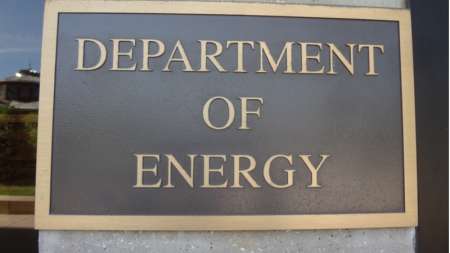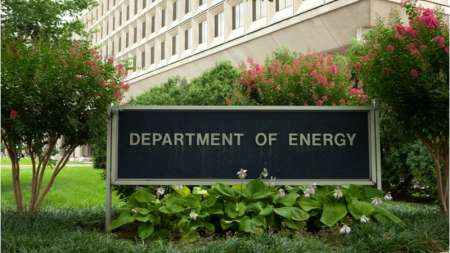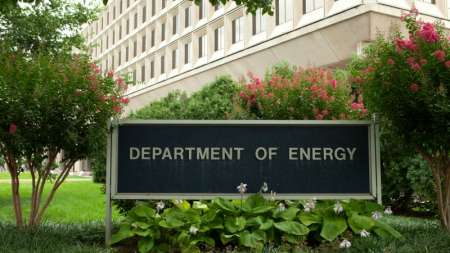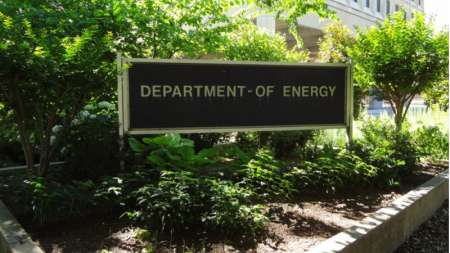President Donald Trump signed a series of executive orders on May 23 that aim to accelerate nuclear energy development by four-fold over current production levels in the next 25 years with the goal of supporting artificial intelligence technology innovation. […]
The Department of Energy (DoE) is headed into uncharted territory in its latest efforts in quantum tech – it’s headed to space in collaboration with a growing list of Federal agencies and goals, a top agency official said on Wednesday. […]
The Trump administration has identified 16 sites on land owned by the Department of Energy (DoE) that would be suitable to build artificial intelligence data centers, and is calling for input about industry’s interest in operating on those sites. […]
The Senate held a pre-nomination hearing on Wednesday for Chris Wright – Trump’s nominee for Department of Energy secretary – in which Wright outlined his plans for expanding nuclear energy technology, AI development, and quantum technology. […]
Top Federal agency technology officials this week preached the virtues of continuous technology modernization as an ongoing process – rather than approaching modernization as a completed effort after specific goals have been achieved. […]
The Department of Energy’s Idaho National Laboratory (INL) has suffered a significant data breach that exposed the data of employees including included addresses, Social Security numbers, and bank account information. […]
The Department of Energy (DoE) has announced $16 million in funding for 15 different projects that will use artificial intelligence (AI) and machine learning (ML) technologies to further research in nuclear physics. […]
Good communication plays an outsized role in how highly federated government agencies – those with numerous component parts – will be able to implement different approaches to zero trust security rather than pursue one-size-fits-all policies, Federal government officials said today at ATARC’s Zero Trust Summit event in Washington. […]
The U.S. Department of Energy (DoE) awarded $70 million in funding to seven research projects that will assist in the continued development of a supercomputer model of Earth’s climate system, according to an Aug. 30 press release. […]
The U.S. Department of Energy (DoE) announced on Aug. 30 that the agency is soliciting input on its plans to provide $2.5 billion of grant money for electric grid resilience, and $3 billion in grant funding for electric power “smart grid” projects. […]
The Department of Energy (DOE) needs to develop a comprehensive approach to electric grid resiliency that coordinates disaster response and grid recovery, as well as utilizes lessons learned from prior natural disasters, according to a June 9 report from the Government Accountability Office (GAO). […]
The Department of Energy (DoE) plans to issue $40 million in funding for research and training in science, technology, education, and math (STEM) areas for historically underrepresented groups, the agency announced on May 25. […]
New legislation introduced in the House on April 21 aims to increase U.S. expertise in energy infrastructure cybersecurity by authorizing Department of Energy (DoE) grants to expand education and training opportunities that are “the convergence of cybersecurity and energy infrastructure.” […]
The Department of Defense (DoD) has announced the publishing of an environmental impact statement (EIS) for the construction and demonstration of a prototype mobile micro-nuclear reactor dubbed Project Pele. The reactor, DoD said, would be capable of producing between 1 and 5 megawatts of electrical power. […]
The Cybersecurity and Infrastructure Security Agency (CISA), along with the FBI, Department of Energy (DoE), and National Security Agency (NSA), is warning that advanced persistent threat (APT) actors are seeking to gain full access to industrial control systems (ICS) and Supervisory Control and Data Acquisition (SCADA) systems, CISA warned in a cybersecurity advisory April 13. […]
The Department of Energy (DoE) is working on finalizing an Artificial Intelligence Risk Management Playbook, and an agency official said on March 9 that it should be released sometime in fiscal year (FY) 2023. […]
House and Senate Appropriations Committees today unveiled a full-year omnibus spending bill covering Federal government operations for the rest of fiscal year (FY) 2022 that ends on Sept. 30. […]
As Federal agencies look to further adoption of artificial intelligence (AI) technologies, experts both in government and industry are stressing the importance of making sure AI is mission-integrated, and that agencies are moving towards a more distributed AI approach. […]
The Department of Energy (DoE) has awarded Verizon two digital communications modernization contracts totaling $34.6 million, utilizing the General Service Administration’s Enterprise Infrastructure Solutions (EIS) contract vehicle, the telecommunications company announced Dec. 1. […]
The Department of Energy (DoE) could improve how it manages its fraud, waste, and abuse practices by improving access to the data used by the agency and its contractors for data analysis, as well as using all tools available to keep the department’s research secure, according to a Nov. 26 DoE Office of the Inspector General (OIG) report. […]
With an international focus on climate change after the United Nation’s Climate Change Conference, Department of Energy (DoE) CIO Ann Dunkin said today that data center consolidation is helping to reduce the agency’s carbon footprint, and pointed to the further use of scalable cloud-native apps as the next step in that campaign. […]
Rep. Bill Foster, D-Ill., has filed companion legislation in the House to a Senate bill introduced in June that would invest $30 billion in deferred maintenance projects and infrastructure improvements at the Department of Energy’s (DOE) network of National Labs. […]
The Department of Energy (DoE) is hoping that investing in research and development (R&D) for supercomputers will help the department achieve its clean energy goals. […]
President Biden plans to nominate Geraldine Richmond as Under Secretary for Science at the Department of Energy (DOE), and Cathy Harris as the nominee for Chair of the Merit Systems Protection Board (MSPB), the White House announced April 28. […]
The Department of Energy (DoE) announced today that Puesh Kumar will be serving as acting principal deputy assistant secretary for DoE’s Office of Cybersecurity, Energy Security, and Emergency Response (CESER). […]
A group of bipartisan senators wrote a letter to Jennifer Granholm, Department of Energy (DOE) secretary, to voice their support for keeping the Office of Cybersecurity, Energy, Security, and Emergency Response (CESER). […]
The Department of Energy (DoE) has appointed Greg Sisson the agency’s permanent chief information security officer (CISO). […]
President-elect Joe Biden confirmed late on Dec. 17 he intends to nominate former Michigan Governor Jennifer Granholm as the new Secretary of Energy. If confirmed, she will head an agency primarily concerned with nuclear energy and domestic energy production, but also a dazzling range of science and technology research and development activities through the Energy Department’s (DoE) National Laboratories. […]
The Energy Department’s (DoE) Office of the Inspector General (OIG) found in a new audit that the agency needs to take action to improve planning for the restoration of information systems in the case of system disruptions. […]
The Department of Energy (DoE) has executed a five-year agreement with Google Cloud for a range of services including the Google Cloud Platform (GCP), Google Workspace, Chrome browser support, and professional services. A dollar-value of the agreement was not disclosed. […]




















